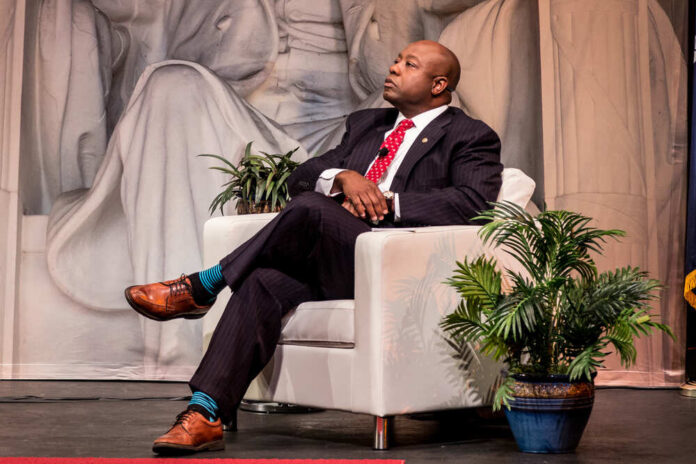
On Monday’s episode of ABC’s “The View,” South Carolina Senator and Republican presidential candidate Tim Scott delivered a decisive counterargument against the narrative of systemic racism. Scott’s perspective, grounded in his personal journey, met with resistance from the show’s co-hosts. Yet, his message rang clear: exceptional success should not be an exception but the norm.
When challenged by co-host Sunny Hostin, Scott passionately disputed the assertion that his rise from humble beginnings to a U.S. senator and now a presidential candidate was a rare exception. As the first black senator elected in the South since Reconstruction, he argued against the notion that his success was an anomaly within the African American community. He conveyed his belief that this message is not only erroneous but is “dangerous, offensive and disgusting.”
Senator Tim Scott to the hosts of The View:
"I’m on the show because of the comments made frankly on this show…the only way for a young African American kid to be successful in this country is to be the exception…? That is a dangerous, offensive, disgusting message…" pic.twitter.com/wAJzL4C3EP
— Townhall.com (@townhallcom) June 5, 2023
Hostin argued that racial inequality persists in key aspects of American life, including economics, education, healthcare, criminal justice, and housing. She framed Scott’s success as a rare triumph over these systemic obstacles, asking him for his definition of systemic racism.
Scott responded by refuting that the path to success for young African Americans must be predicated on being an “exception.” He argued based on the progress that has been made in American culture: “Yesterday’s exception is today’s rule.” This statement underscores his belief in the transformative power of time and the gradual realization of the American dream.
Had a constructive conversation with the ladies on The View, even the producers can’t stop me.
The principles of our conservative message prevail everywhere. pic.twitter.com/k6BercnwTq
— Tim Scott (@votetimscott) June 5, 2023
His argument was buttressed by numerous examples of prominent African Americans who have held high office. He noted that America has had an African American president, vice president, and two secretaries of state. Closer to home, the police chief of his home city and the head of the highway patrol for South Carolina are African Americans. Unemployment in the African American community has significantly decreased, further supporting his viewpoint.
Hostin countered by pointing out disparities like the high homelessness rate among African Americans. Yet, Scott held his ground, emphasizing the necessity of respect and deference in these conversations.
In a poignant moment, Scott shared a story about his grandfather, who experienced firsthand the indignities of racial segregation. His grandfather held firm to his faith in God, himself, and the potential of the future. It’s this hopeful vision of progress, Scott argued, that drives success, not a fatalistic view of systemic barriers.
Scott’s take on systemic racism, which has been compared to the views of African American Supreme Court Justice Clarence Thomas, is likely to continue sparking debate as his presidential campaign advances. Regardless of one’s political leanings, his perspective reminds us that the American dream should be accessible to all, not just an exceptional few.














